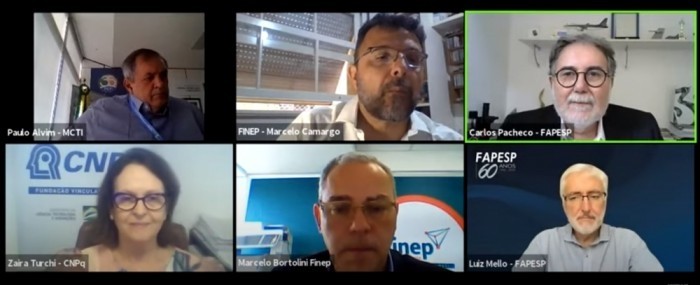
FAPESP issues call for innovations from young entrepreneurs under Centelha program
21 de setembro de 2021FAPESP Innovative R&D – On September 14, 2021, FAPESP issued its call for proposals for the second edition of Centelha (Spark), the national program to support innovative entrepreneurs and disseminate entrepreneurial culture among young people.
The first edition was launched in 2019 and has been implemented in 26 states across Brazil. The program is an initiative of the Ministry for Science, Technology and Innovation (MCTI) and FINEP, the Brazilian Innovation Agency, in partnership with the National Council for Scientific and Technological Development (CNPq), the National Council of State Research Support Foundations (CONFAP), and CERTI Foundation. FAPESP will execute the Centelha 2 program in São Paulo.
Individuals over 18 and small enterprises have until October 25 to submit innovative ideas for Phase 1. If approved, they will go through to Phase 2, when the proponents must submit a formal entrepreneurial project. The program includes training to enhance innovation projects, as well as support and feedback from the evaluators.
The best 50 projects will go on to Phase 3, when projects must become funding applications. Those selected will receive BRL 80,000, shared by FAPESP and FINEP, as well as scholarships supplied by CNPq.
Phase 3 projects in the Centelha Program will also be eligible for the FAPESP Innovative Research in Small Business Program (PIPE), which could guarantee their continuity, according to Patrícia Tedeschi, FAPESP’s Manager for Innovative R&D.
The call is expected to attract a response above all from young entrepreneurs, as well as undergraduates and graduate students at universities in the state of São Paulo.
The call is available (in Portuguese) at fapesp.br/15064.
Experiment for PIPE Zero
“FAPESP has worked with FINEP for a decade on Phase 3 of PIPE, which involves commercialization of innovative products. Centelha 2 will be an experiment for PIPE Zero, which will support initial-stage entrepreneurial ventures,” said Carlos Américo Pacheco, FAPESP’s CEO, in his address to the program launch event.
Luiz Eugênio Mello, FAPESP’s Scientific Director, recalled that supporting technological development is one of the missions given to the foundation by the São Paulo State Constitution in 1989. “FAPESP has launched several initiatives in this direction. One of them is PIPE, which supports entrepreneurs in the conceptual stage of innovations [Phase 1], project development [Phase 2] and product commercialization [Phase 3], in partnership with FINEP. The program also has a training component, called PIPE Entrepreneur, and more recently we introduced PIPE Invest. Now we’re launching PIPE Zero alongside Centelha,” he said.
Marcelo Bortolini, FINEP’s Director of Scientific and Technological Development, noted that more than 15,000 ideas were presented to the first edition of Centelha by entrepreneurs in 1,000 cities. “Centelha supports innovation from idea to prototype to the product before it’s brought to market. This has been a relatively neglected area for FINEP until now,” he said. The call with FAPESP for Phase 1 of Centelha, he added, is expected to receive around 1,000 innovative ideas.
The program’s strategic goals, according to Bortolini, encompass helping establish startups, encouraging young entrepreneurs to connect with the innovation ecosystem, and creating a nationwide culture of innovative entrepreneurship. The methodology developed by CERTI Foundation has been tested in Santa Catarina, assuring scale and conversion of ideas into innovations.
For Zaira Turchi, CNPq’s Director of Institutional Cooperation, the scholarships offered by CNPq under the Centelha program can be awarded from the start of the call. “This will give the program an initial boost,” she said.
“Science and technology in Brazil can’t be done without São Paulo,” said Paulo Alvim, MCTI’s Secretary for Entrepreneurship and Innovation, adding that expectancy regarding the results of FAPESP’s call is high. “The next step will be Centelha 3, which will be a permanent program and stimulate more partnerships with all state research foundations, including FAPESP, with which we’ve had successful partnerships. FAPESP’s experience sets an example for the entire country.”
The launch event can be watched on Agência FAPESP’s YouTube channel.
